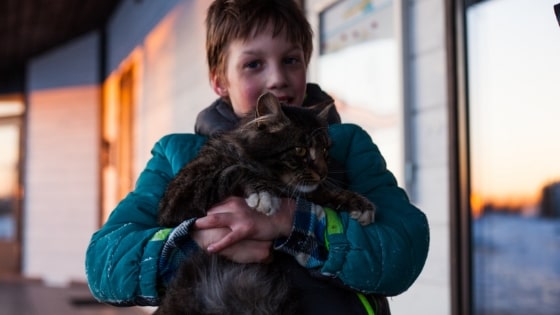
How to Work with Different Personalities as a Vet Technician
In any workplace, you’ll meet people you don’t always see eye to eye with. You’ll also meet people you mesh with immediately. Veterinary clinics are no different! For some expert advice on working with the different people you’ll interact with as a veterinary technician, we sat down with Megan, the Department Chair for Penn Foster’s Veterinary Academy! Check out her advice here.
Nov 02, 2018
6 min read
You’ll meet a lot of different people as a vet tech!
Students pursuing a career in veterinary medicine are often some of the most determined, goal-oriented individuals. You know what you want to do and you work hard to get there! But, sometimes, that focus can get off track when you’re faced with the wide range of personalities you’ll run into working as a vet tech.
In any workplace, you’ll meet people you don’t see eye to eye with. You’ll also meet people you mesh with immediately. Veterinary clinics are no different! For some expert advice on dealing with the different people you’ll work with as a veterinary technician, we sat down with Megan, the Department Chair for Penn Foster’s Veterinary Academy!
About Megan
Megan, a Certified Veterinary Technician, worked in a local, general practice before coming to Penn Foster. As Department Chair, and through her experience in the field, she’s worked with different types of people and knows how frustrating it can be trying to deal with someone who is completely different from you. Here’s her advice.
What are the most important traits any Vet Tech should have?

Megan: There are so many things a vet tech should know, but it’s important to be motivated to do your job. You also need to able to work in a fast-paced environment, always be willing to learn because there’s new information that comes through all the time. You should also have an open mind and be adaptable, especially with clients.
As vet techs, we all have different opinions on different methods of taking care of animals, so it’s also important to be conscientious of others, especially clients.
What are the most common personalities you’ve run into in a veterinary clinic?
Megan: Just like any other workplace, there are a bunch of different personalities working together at a clinic.
Usually you’ll have the person in charge, the one who has been there the longest. They’re the go-to person for everyone, experienced, and knows their way around the clinic. They’re usually trusted by everyone in the clinic, like the vet, because they’ve proven themselves.
You’ll also have the “mom” (or dad!) coworker. They’re the person making sure that everything and everyone is okay. They tend to be the more nurturing individual and are the go-to person for advice. This personality is really great to learn from because they have a lot of empathy and are patient, happy to share what they know.
You will also run into the extra motivated, goal-oriented people. These people are the ones that tend to quickly move up the ladder at work because they’re always looking to advance their career. They’re good to learn from because they usually like to master every new skill. At the same time, it can be tough to learn from them because they often move at a much faster pace than expected.
And in general, you’ll meet the usual reliable people who can be counted on to always be consistent with their skills and work ethic. But, no matter the personality type you are or the various types you work with, everyone is in this field because they care about helping animals and their humans.
Do you think that different types of practices work better for different personalities?

Megan: Well, small veterinary practices are more steady paced, with more of a pattern. It’s still fast paced compared to other professions, but it’s easier to predict what will happen during the day in a small practice. Tasks are pretty similar each day, and there are scheduled appointments with clients. Someone who is more introverted or who may not be confident right away in their vet tech skills might do better starting out in a small practice until they’re more comfortable.
Emergency vet medicine is high stress, incredibly fast paced, and you really have to be open to change because you are seeing different things all of the time. You have to think fast, be super flexible, and ready to work as a team from the start.
Emergency clinics may not be for the ones who are very sensitive to the emotional difficulties that come with working in veterinary medicine. Animals that are brought to emergency clinics are often close to dying and it can be tough to deal with that while also working as fast as you can to save them.
Working in the field can definitely be high stress and sometimes, that means conflicts with coworkers. How should a vet tech deal appropriately with conflict in the clinic?
Megan: It’s always a tough situation but I’ve found, in my experience, it’s best to be the neutral person, especially if you’re the new person at the clinic. Try not to get caught up in the drama that may have developed before you got there. Be neutral, be Switzerland, and be above the gossip. That can be hard to do, but I also think that remembering why you’re there can be a big help. You’re there because you want to help patients, help their humans, and make a difference.
Some other strategies I’ve used for dealing with conflict include treating others how I want to be treated, with respect.
If I’m in a difficult situation with someone, I’ll try to approach them to see if we can talk through it and work it out. However, at the end of the day, if it’s a toxic situation, you should talk to your manager.
What about when you have to work with clients who are difficult or have personalities that you don’t naturally mesh with?

Megan: I usually try to relate to them, even if I do have a difficult relationship with them. I’m there to help their pet and try to work in a way that makes sense to them. The end goal is to always try to help them, their animal, and also educate them on how to take care of their animal. Sometimes, you do have to just deal with things you normally wouldn’t because they’re the client. My best advice is to not let emotions influence your reactions.
As vet techs, we wear our hearts on our sleeves because we care a lot! We love animals and want to help them. And that’s sometimes super challenging because you are a bit vulnerable, but it’s a big part of the career.
Finally, what advice do you have for vet tech students or new vet techs in the field when they’re struggling to fit in with their coworkers?
Megan: Get to know them! Find something in common, whether it’s that you both like the same dog breed or you both love horror movies. Also, that person you may think doesn’t like you may just be an introvert. There are a lot of introverted, science focused people in the field and they may feel just as awkward or nervous as you about building relationships with coworkers.
Remember why you love this field!
At the end of the day, no matter how long your shift was, or how upset you are about a confrontation with a coworker, the vet assistants, vet techs, veterinarians, and others you work with are there for the same reason. You’re all working to help the dogs, cats, rabbits, and more feel their best and comfort their humans when their pet is sick. Take a deep breath and do what you do best, taking care of our furry friends.



